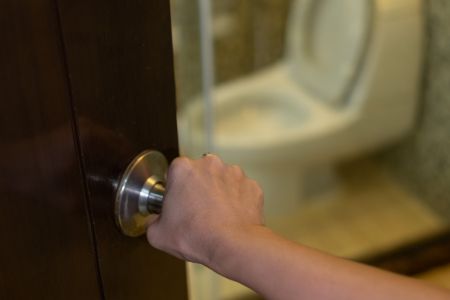
Peeing at Night Frequently?
Solutions to help you stop peeing at night and get a restful nights sleep.
It’s just past 4 a.m., and the house is quiet. For the third time tonight, you are quietly getting out of bed to pee, knowing that if you’re lucky, you’ll get two more hours of sleep before the alarm buzzes. It’s not exactly a restful night, but it’s nothing new, and you don’t see it changing in the future. This is life with nocturia.
You’ve tried diet changes and drinking less water before bed, but you’re wondering if you have a more serious medical condition. If you’ve complained about it to your friends, you’ve likely discovered that these nighttime bathroom visits are common. At least 20% of people over age 50 share the same struggle. For those older than 70, up to half are getting up two or more times a night.
The nocturia definition is waking up one or more times at night to void your bladder. This medical term comes from Latin and Greek words meaning “night” and “urine”. For individuals who are waking multiple times per night, this condition is not only annoying but can be unhealthy. Nocturia leads to sleep deprivation, which can cause exhaustion, mood changes, sleepiness, and impaired productivity. Lack of sleep also increases the risk of falling and becoming seriously injured during these nighttime bathroom visits.
Frequently, nocturia is referred to as nighttime overactive bladder (OAB), however, this is not an accurate description. OAB is related to uncontrolled bladder spasms that can happen day or night. Individuals with OAB can have nocturia, but there are numerous causes for nocturia that are not related to OAB. Nocturia is also different than adult bed-wetting, or nocturnal enuresis, in which urine is involuntarily released during sleep.
These are the three main reasons for nocturia:
Several underlying causes contribute to nocturia. Common underlying causes include:
After diagnosing the cause of your nocturia, your doctor may recommend medication. These medications are designed to reduce urine production, calm unwanted bladder contractions, or treat infections. Your doctor may also recommend lifestyle changes, including weight reduction, reduced evening fluid consumption, and taking naps to recover your lost sleep. If your nocturia is caused by a structural problem, there may be surgical options. One simple treatment to try at home is to wear compression socks.
Electrical stimulation (E-stim) of pelvic floor muscles is widely used to treat both urge and stress incontinence. However, the direct impact of E-stim treatment on nocturia has not been widely studied. Recently, a team of experienced incontinence researchers published a study in which they evaluated two non-drug nocturia treatments. The first technique, called tibial nerve stimulation, electrically stimulates a nerve near the ankle to remotely calm bladder muscles. Patients achieved a significant improvement in sleep quality. The second treatment was pelvic floor muscle training (PFMT). The subject performed weekly in-clinic Kegel exercises under the supervision of a physical therapist and daily Kegel exercises at home. Patients receiving PFMT achieved an even greater improvement in sleep quality.
In another report, PFMT was used with biofeedback to help women suffering from stress and urge incontinence, and who were bothered primarily by nocturia. Treatment reduced their nighttime bathroom visits to 1–2 per week, which tremendously improved their quality of sleep.
Although neither report investigated exactly how the therapies acted to treat the nocturia, the favorable clinical outcomes support the need for further investigation. Most medications seek to reduce urine production or calm the bladder muscles, however, PFMT could improve the function of the muscles that control bladder leakage. Given the common occurrence of nocturia during and after pregnancy, this outcome is intuitive. By improving pelvic floor muscle function, the bladder accommodates greater urine volume resulting in less frequent nighttime voiding. Devices can be used to help with pelvic floor muscle training at home. Learn more HERE.
Yes, Elitone treats stress urinary incontinence in women by using an externally applied pelvic floor muscle stimulator. The device gently exercises the pelvic floor muscles. Little known, the device ALSO sends signals for urgency in each cycle! You can use it anytime and anywhere because it’s worn under clothing so no one will know you’re using it. Learn more HERE. If your urinary incontinence is bothering you at night, Elitone may be a good solution.
With Elitone, I can wear it under my clothes and watch a movie. It’s so easy to use! PLUS, before Elitone, I struggled to sleep through the night. Now I get more rest. — Teresa, 47